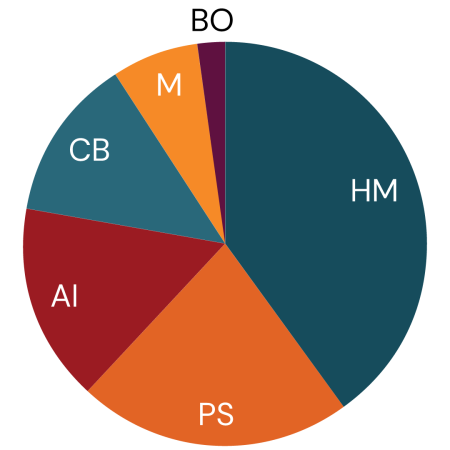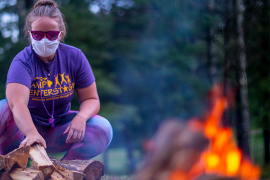The American Camp Association (ACA)’s Camp Crisis Hotline is a free, confidential, call-in resource for camp and youth development professionals that is available 24 hours a day, 365 days a year.
The Crisis Hotline Team consists of ACA staff members who are trained to listen and offer guiding questions a caller might consider when faced with a crisis or unexpected situation. Our goal for each call is to help the caller identify where in their own policies and procedures they might find a way to address the situation. We also share resources, many of which can be found on the Camp Crisis Hotline web page.
How do we define crisis? We don’t. A crisis is any situation for which a camp professional — regardless of their ACA membership or accreditation status — might want support. From bed bugs to wildfires, difficult parents to bullying, we take every call seriously and do our best to provide resources and considerations for next steps. We are not legal experts nor medical personnel, yet many of us are former camp professionals and know from experience how easily a crisis at camp can occur.
Historically, calls to the Crisis Hotline fall into broad categories, and we track the number of calls in these categories over time to give us a sense of emerging issues. With this information we develop professional development resources to help camp professionals prepare for and mitigate crisis situations that might be new or particularly challenging.
Categories of calls this year:

Health and medical — 40%
(55% of these calls were COVID related)
Personnel/staff — 22%
Abuse issues — 16%
Camper behavior — 13%
Miscellaneous — 7%
Business operations — 2%
Top Trends
Health/medical issues returned to the top category of calls this year.
Questions and clarification about COVID -19 were by far the most frequent calls. ACA partnered with the Centers for Disease Control and Prevention (CDC) and the Alliance for Camp health (formerly the Association of Camp Nursing) to provide the latest information. However, camps often called us to help them sort through the mixed messages being sent out by the media, parents, and their local health departments.
- Mental health issues in campers and staff
- COVID
Personnel and staff issues comprised the bulk of our calls this summer.
If we were to remove the COVID-related calls from our calculations, this category represents the largest group of calls. Some were questions about hiring practices, including finding and retaining staff. The remaining calls involved staff behavior and potential firing procedures. Now is the time for you to be considering your staff policies – before you begin hiring staff for next season. We noticed that most issues resulted from a camp not having clear written policies about staff behavior.
- Staff shortages
- Staff feelings of being overworked and underappreciated
- Staff retention
Issues of allegations of sexual and nonsexual physical abuse were abundant this summer.
These subjects are always the most difficult for the caller to discuss. Sixteen percent of the calls to the hotline were related to issues of abuse. Most of the allegations of abuse calls — 67 percent — concerned camper-to-camper abuse.
- Camper-to-camper bullying and instances of sexual abuse and/or misconduct
- Active supervision
Mental Health Issues:
This season brought a unique dose of staff and campers feeling anxious and overwhelmed and lacking coping skills to get through typical camp day activities. Overall, camps seemed prepared or more ready to accept this year’s mental health needs and challenges. This is good news. While mental health issues were still pervasive among hotline calls, they didn’t necessarily rise to the level of crises as they have in past seasons. Self-harm and threats of suicide were among the leading areas that camps struggled with in this category.
- Suicide ideation
- Self-harm
- Staff not mentally fit for camp
- Eating disorders
Call Categories
Take a closer look at the call categories and consider some of the takeaways for your program. Our calls fall into the following general categories:
Health and Medical — 40 Percent of Calls In 2022
This summer we find the health and medical category of calls returning to the top percentage of the calls we handled. However, 55 percent of these calls were COVID related.
The Health and Medical category includes a broad range of topics from mental health issues to the treatment of common childhood illnesses and injuries, from questions about healthcare procedures to dealing with a death at camp.
Mental health issues make up the largest percentage of calls in this area. It’s critical that camps prepare for mental health concerns for campers and staff. A health/medical support system should be in place to address these needs as they arise.
We have found in these calls that many camps do not have healthcare staff who are familiar with issues common in a camp setting. Sometimes we received questions regarding the laws related to healthcare at camp (e.g., “Who can distribute medications?” “Is my license accepted in this state?”). In other cases, camps simply want to discuss the steps they have already taken and benefit from talking to a third party who can help point out other questions or steps they might not have considered. Calls in this category included:
- COVID-related calls
- Camper and staff mental health issues
- Suicidal ideations and threats of suicide
- Eating disorders
- Cutting and other self-harming behaviors
- Outbreak of communicable illnesses (non-COVID)
- Pregnancy
- Medication management
- Death from natural causes
Lesson Learned – Health and Medical Issues
Prepare for mental health concerns for campers and staff and have a health/medical support system in place. The number of calls to the Hotline on mental health concerns appears to mirror a societal trend. Camps need to have a mental health support system in place and should add mental health resources and experts to the team and healthcare plan. This plan includes not just your on-site health-care staff, but the list of contacts you would phone in the event of the unexpected. (e.g., mental health professionals, dentists, etc.). If your program travels to another state, ensure your staff have access to mental health resources nearby.
In the event of a serious accident, injury, or infestation, an excellent communications plan is critical. Many callers this year just wanted help crafting messages about an incident that they could share with families, the media, and others. Camps should develop a communication plan template that can easily be edited for any situation that arises.
Personnel and Staff Issues — 22 Percent of Calls In 2022
If we were to remove the COVID-specific calls from the health and medical category, this category would represent most of the calls we heard this summer. Calls in the personnel/staff issue category are commonly related to gaps in a camp’s personnel policies and/or inconsistent enforcement of currently established policies and practices. Calls in this category included:
- Staffer in trouble with the authorities
- Frustrated staff unhappy with camp administration
- Staff caught drinking
- Staff vaping with campers
- Sexual and racial harassment
- Accusations of sexual assault away from and unrelated to camp
- Staff attempting to unionize
- Staff quitting and then publicly talking negatively about camp
Lessons Learned — Personnel/Staff Issues
Identify an employment attorney to provide you with legal counsel. Identify this resource before you begin your hiring cycle. An attorney with experience in labor laws, contracts, and employment issues that you can contact for help at any time is an invaluable resource for any camp.
Enforce your personnel policies. It’s not enough to simply have such policies — you must enforce them as well. Establish a clear understanding of what the consequences are (reprimand, suspension, dismissal, and so on) for the violation of the policies. If you don’t enforce your own policies or enforce them inconsistently (such as treating one staff member differently than another for ignoring the same policy), you leave yourself open to all kinds of risks — including lawsuits. And, as noted above, consider staff coverage if you need to terminate someone.
Have a backup plan for staff coverage in an emergency or unexpected loss of staff. Supervision ratios are critical to ensuring the safety of your campers. What will you do if you have a policy against alcohol on property and you catch numerous staff drinking? Before the season begins, identify short-term options you can turn to for staff coverage in an emergency.
Allegations of Abuse — 16 Percent of Calls In 2022
Issues of allegations of sexual and nonsexual physical abuse are always the most difficult for callers to discuss. Sixteen percent of the calls to the hotline were related to issues of abuse. Of these calls:
- Sixty-seven percent concerned camper-to-camper abuse.
- Twenty-two percent of the abuse-related calls involved a camper revealing they had been abused at home.
- The remaining calls dealt with self-pleasure and a historic abuse concern.
Lessons Learned —Allegations of Abuse
Attentive, active, and involved staff supervision is the key to keeping campers from harming, bullying, or abusing each other. It is critical that your staff be vigilant about identifying situations where campers could be alone and potentially abuse each other. All the calls to the Hotline about camper-to-camper abuse issues allegedly occurred in those brief moments when staff were not directly in contact with them. During sleeping time, overnights in tents, trips to the bathroom, and when campers are changing clothes for the pool are clearly the times when camps need to be acutely aware and on the lookout for any inappropriate behavior among campers. Provide training and policies to ensure that campers are not alone without staff supervision — ever.
Allegations of abuse outside of camp: It is not unusual for abused children to reveal at camp that they have been abused elsewhere. Many children feel safe at camp because they feel that people there care. So what they might not have revealed at home is sometimes more easily revealed at camp. In these situations, children often say, “Please don’t tell anyone.” You cannot promise them that. Instead, assure them that you do care and that you must tell people who can help. Camps should ensure that their staff are trained to recognize signs and symptoms of abuse and understand the policies and procedures for reporting suspected abuse.
See something, say something — teach your staff and campers to be ever vigilant and question what they see. It takes just one person to step up and question when they see something not right about the way an adult is interacting with a child. You may be the one who is able to free a child from serial abuse. Always have the best interest of the child in mind. Every camp should have policies and procedures to ensure that staff are never alone with a child.
The law is clear. You must contact authorities if there is an allegation of abuse. All camps fall into the category of mandated reporter. Mandated reporters are people who have regular contact with vulnerable people and who are therefore legally required to ensure a report is made when abuse is observed or suspected. They may be paid or unpaid people who have the responsibility of care.
A note on mandated reporting to Child Protective Services (CPS): CPS typically investigates abuse in the home. Some counties have robust processes for screening out calls (automatically passing to other authorities) if the alleged abuse is outside of the home, and some will just tell you, “We don’t deal with abuse outside of the home.” This is where relationships are key. Research your county’s process. Find the contact information for the sheriff or detective who investigates abuse of minors if it happens somewhere other than home.
Those working within a university system may have explicit reporting guidelines, and the presence of campus police may affect how you’ll handle these situations.
Camper Issues — 13 Percent of Calls In 2022
Calls in this category primarily focus on an individual camper’s behavior in general. Camper issues can certainly intersect with other categories, but some of the themes in this area were about behavior that often led to a camper’s dismissal or behavior that was harmful in a physical or sexual manner. Times when bullying, physical assault, or sexual assault happened were frequently a result of a lack of adequate supervision in places such as cabins at night and showers. It’s worth reviewing these times and places to determine greater deterrence measures. Calls in this category included:
- Campers suspected of smoking and/or vaping marijuana
- Relational aggression
- Bullying
- Inappropriate language (sexual in nature)
Lessons Learned — Camper Issues
Ensure that parents and campers understand your camper behavior and related policies and their consequences. If, for example, your camp has a policy that campers cannot have cell phones while at camp, be sure campers and parents understand what specific consequence you will render if a cell phone is found.
Strict and well-enforced staff supervision policies are key in decreasing camper behavior issues. Ensure that your procedures and staff training are designed not only to protect the safety of campers, but also to identify situations where campers could be tempted to behave inappropriately.
Make bullying prevention a priority from the first day of camp, and let all campers and staff know that bullying behavior is unacceptable. All campers need to feel safe both emotionally and physically. One person’s description of bullying is another person’s description of abuse. Set bunk and group rules with explicit examples of acceptable and unacceptable behaviors regarding bullying. Post these rules and have staff and campers review them together.
Campers’ belongings can be searched if you suspect illegal or unsafe activities. Unless the camp is owned by a public entity (e.g., the city recreation department), there are no constitutional issues in having a policy to search campers’ belongings. Invasion of privacy issues may be superseded by safety concerns. Make sure that parents are aware of your policies.
Implications for Your Camp — Summer 2022 Case Studies
As you might expect, the calls we receive rarely fit neatly into one category. Each crisis is unique, and it is in this uniqueness that we find the most opportunity for learning and preparedness. The crisis scenarios we share herein represent what we consider emerging trends based on the number of calls with similar themes we received this past year, and, in some cases, the last several years. Each shared scenario includes questions you might ask during staff training and questions you might consider when reviewing your camp’s policies and risk management plans.
While each case is based on actual calls we received to the Crisis Hotline this year, they have been adjusted to maintain the confidentiality of the callers and their situations. You’ll also notice that we do not provide the after story. That is in part circumstantial — we do not often hear how the story ends — and partly intentional. Each case is meant to prompt critical examination of your own policies and practices rather than to suggest that every camp can follow the same steps and reach the same outcome.
- Case Study #1
- Case Study #2
- Case Study #3
- Case Study #4
- Case Study #5
- Case Study #6
- Case Study #7
- Case Study #8
Wrapping Up: Preparing for Crisis at Your Camp
Camp is a place full of the unexpected, and, as these case studies illustrate, the unexpected can include situations that are difficult and frightening. We hear hundreds of stories from camp professionals each year about the crises they face — and no crisis is too big or too small to justify a call to the ACA Camp Crisis Hotline. Some situations might be preventable through regular and systematic emergency action planning; others simply are not. But all are important opportunities for learning, both at your camp and as a community of camp professionals.
We hope the cases and prompts covered here serve as a starting point for dialogue and critical examination of your policies, practices, and staff training.
A few things to remember about the ACA Camp Crisis Hotline:
- It is available to any camp professional experiencing what they feel is a crisis, regardless of ACA membership or accreditation status.
- It is free and confidential, available around the clock, 365 days a year.
- It is staffed by ACA staff members with experience working at camp but who are not legal or medical experts.
- Our most shared resources are available at ACAcamps.org/resource-library/camp-crisis-hotline.
Call us at 800-573-9019.
Crisis Hotline Recommendations for Emergency Preparedness
While each case is unique, we find ourselves asking callers to the Crisis Hotline a similar set of questions. The following recommendations are based on these questions, and while they will not prevent a crisis, they are things you’ll want in your tool kit should you face an unexpected crisis at camp.
- Develop a working relationship with your insurance company and representative. Review their resources so you know what they can and can’t do. Know and understand the limits and coverages afforded your camp by your various insurance policies.
- Ensure access to legal counsel. Consider it an investment. If finances are an issue for retaining legal counsel year round, consider alternative means of accessing such counsel (e.g., compiling a list and reaching out to local law schools, members of camp or agency board of directors, camper parents/families, alumni, other nearby camps, community legal aid clinics, your insurance company, etc.)
- Ensure access to mental health professionals. Develop relationships with and a network of mental health professionals, including social workers, counselors, therapists, family counselors, or other professionals who are available and willing to be both on site and on call to help with camper and staff mental, emotional, spiritual, or relationship issues and needs.
- Develop a thorough crisis communication plan. In the event of a serious accident, incident, injury, or infestation, an excellent communications plan is critical. The well-prepared camp has considered and prepared their key messages for a variety of audiences (parents, media, staff, board, etc.) and a variety of possible scenarios common to camp. When possible, camps should consider employing an experienced public relations professional or securing access to such a professional should the need arise.
- Review your supervision policies and procedures. Attentive, active, and involved staff supervision is the key to keeping campers from harming each other. Well-enforced and intentional supervision policies are critical in decreasing camper behavior issues. Camps must ensure that their procedures and staff training are designed not only to protect the safety of campers, but also to identify situations where campers could be tempted to behave inappropriately.
The views and opinions expressed by contributors are their own and do not necessarily reflect the views of the American Camp Association or ACA employees.




